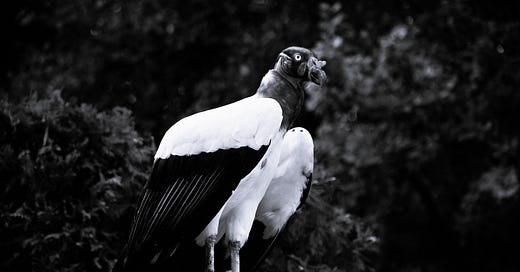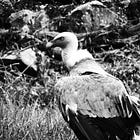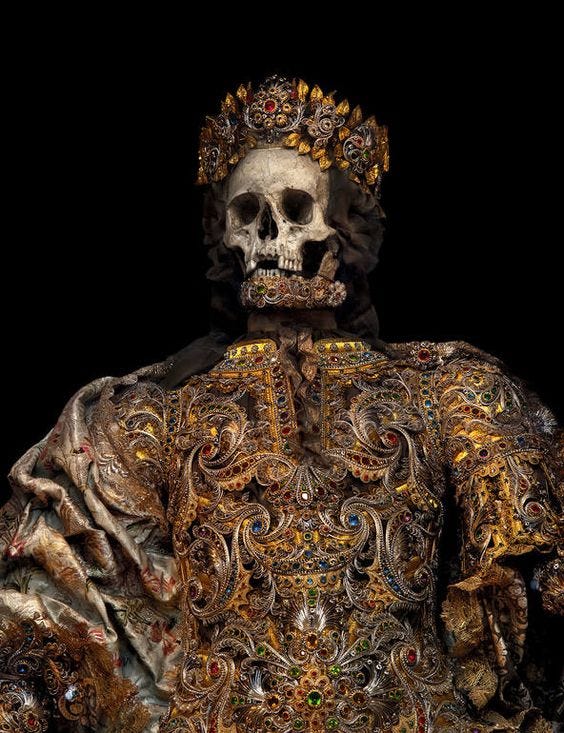TTOWB: Run Cried the Crawling
Chapter 5, where we coincidentally learn about the local cult and a mysterious luxury hotel.
Want to read more from this serialised novel? Here’s the Content Directory:
The Tenderness of Wild Beasts
Photo & Text all rights reserved © Saint-Lazare, 2025.
Chapter 5: Run Cried the Crawling
There was a ghost in my DNA. As a child, I had a lot of weird intuitions that often took a foreknowledge color; for example, I was sure my birthdate on October 3rd 1985 had a secret about it. With years, I had acquired the conviction that my existence had a father-shaped hole, with Oliver being completely offside. That certainty was fed with several intangible sensations encountered while enjoying the discretion of the only child. I was never close to proving my theory, yet I had a near-epiphany experience each time we were going on a trip to Lake Berryessa.
While we were heading north, there was a noticeable change of atmosphere in the car, a kind of nostalgic excitement transforming Mum into a younger, more outgoing woman. She was clowning around, putting her bare feet on the open window and pumping up the volume to fill the interior of the car with songs of Simon & Garfunkel, Supertramp, or Donovan. And, of course, she was ignoring the protests of Killjoy Oliver. It was a moment for her and I to connect on the same secret wavelength and I cherished that.
I loved going to Lake Berryessa. As a kid, it was my favorite place on earth. We were parking the car in the shadow of some trees and we would picnic near the water, before relaxing in the freshness of the lake. I often explored the bank by myself, to admire the ever-changing domination of the transparent liquid over the rocks, progressing like an explorer in the bushes of vegetation that were isolating one peninsula from another. The heavy sun was burning the grass and whitening the stones, while every tree seemed to be electrified with the crackling of cicadas. It was a wild, intense place for sure. The warm wind sometimes moved the pale dust, releasing a smell of burnt nuts and attracting birds of prey. I lay on the ground to watch them, silently floating in the vast azure sky, revealing by time their different shades of darkness in indiscreet rays of light. Their echoing screams and hypnotizing circles never seemed gloomy to me, much more like an important omen I needed to decipher.
Yet, it may have been my childish imagination but the allegedly peaceful afternoons we were spending at Lake Berryessa always had their paranoid side. We could stay there for hours without seeing a soul except for the distant silhouettes of slow-witted fishermen on the opposite bank. However, if someone was coming too close to us or to our car, all my senses were on alert, convinced of the threatening nature of that sudden proximity and ready to act in consequence to protect us. To think that I only learned about the attack of Cecelia Shepard and Bryan Hartnell by the Zodiac years later, and considering the obsession you are nursing for that serial killer, it may make me wonder what was hiding in my genes.
A tension was also palpable between Mum and Oliver. He was obviously irritated by her array of emotions, passing from rapture to spilling some tears in a couple of hours. When I was leaving them to train my ricochets, I could hear them argue. Once he asked if she was hoping to stumble on him when coming there. I treasured that “him” as the first evidence in the open case of my genuine father’s identity. Another time, Mum confessed that she once came to the lake with some Stanford’s classmates and that it was the most enjoyable day of her life. She was apparently forgetting my birth, but I did not take it as an outrage, all absorbed by another clue leading me to you. When I decided to leave Boston to find you, I obviously started by a visit to your university.
I was not expecting the kind of portrait people painted of my mother there. Of course, I had already seen faded photographs of her student self, eerily looking like me with that round cherub face, tiny lips, prominent nose, and the eyes, adorned with phlegm but no make-up. I was familiar with the Rimbaldian tuft of hair, the cigarette elegantly glued to the hand as well as with the oversized 70s glasses and a bunch of quirky clothes I found in her cupboard. I could spend hours locked in that closet, huddling in the different fabrics, feeling their textures. In the middle of the soporific smell of naphthalene, I was trying to isolate and recognize those scents of another time and another life, to guess the memories attached to them. While in Stanford, I had learnt that these memories –these smells– could in fact include a lot of drugs as well as a rumored threesome.
Among the names of her male friends, my interest soon narrowed to one, a certain Egon Selliken. You. My missing father. Apparently, being missing is a flaw both children and adults have in common in this story. I never stapled flyers to find you; maybe I should have. We would certainly not have this kind of conversation now. Did the Garrison children leave to look for their own absent genitor the way I have looked for you?
I was lying naked on the bed of the room I rented in the motel near my former Elementary School. My dirty cocktail dress and undergarments from the party were lying on the floor. From the window, I could see the Salinas River as well as the old golf course Chance took us to once, Jud and I. I remembered that he was a dark skeleton over the dried, painted grass.
However, I could not turn my eyes away from the lit screen of the TV. The disappearance of Fiona and Nathan was on every channel. Pictures of their evaporated childhood alternated with captures from videos of Judith’s wedding party. The idea of seeing myself appearing on images linked to some kind of dramatic event gave me the heebie-jeebies, yet, I did not switch the TV off.
Finally, the repetitive sequences –happy angel faces versus careless party-goers– vanished to focus on the even more sweeps-friendly figure of the Mater Dolorosa. Delia Garrison was introduced as a single working mother who was inevitably scared stiff by the loss of her offspring. Despite her hangover, she was looking directly at the camera with a posture skillfully selected to rank well in the #strongwomen hashtag page, and baby talking to thousands of viewers. It was unclear if she hoped that her eight year old daughter and six year old son were passive-aggressively waiting to reappear while watching the news somewhere or if the embarrassing babbling was meant to extract info on their whereabouts to potential adult witnesses.
It somehow reminded me of a conversation I kept having with my own mother. The last time we had it, the cocktail dress was still neatly lying on the bed, brand new. It felt like years ago but it was only the day before; perhaps because the conversation was a recurring, hackneyed tune.
“Darling, you need to come back to Boston. It was just an accident,” whispered Mum.
“Do you mean, hiding that Oliver was not my real father and that Egon Selliken was?”
She silently yet noisily hated each time I was pronouncing your name.
She sighed, “I’m referring to the condor.”
I complained, “You never mentioned him. Not even in your books.”
Maybe I could have forgiven the lack of confession, but, to me, the blatant oblivion of the most important person of our lives in her writings was blasphemy. I had fronted the closed door of her office –barely deadening the violent clicking of the keyboard– too many times when a maternal presence was required. She was writing when I had the condor accident. She was also writing that night, when I had another kind of accident. So, the least she could have done was to scatter some clues on your identity in the pages she was spilling ink on. To show that it mattered. To show that I mattered. I heard her moan on the line.
“It was not worth it, darling. You are romanticizing us. Him. You have to trust me. Oliver was far from ideal but he was there. Now… I mean, really, you have nothing left to do with Lucero. Come back to Boston. Please.”
I hung up on her. At that moment, the idea of being somewhere else than in Lucero was making me dizzy. However, the reason why I came to my hometown was just across the street and I had not found the courage to cross it yet. I was sitting alone in the dark motel room, the clammy air from the open window sticking to my naked skin. I considered the evening gown next to me; it had the color of the silence inside the car on the road back home from Lake Berryessa. A silence infused with regrets and unsaid things. I had bought that fucking dress, so all I had to do now was to go to that fucking wedding party.
While I was on my way, in my rented Chevrolet, I remembered a place that kept fascinating me when I was a child. It was this very private estate, the one of the Fire Signs.
The Fire Signs was a cult surrounded with many Mansonesque stories. Stuck in the hollow of a canyon, the hacienda seemed to crawl from hell to darken the Californian sky with towers and gothic-looking statues. With their minimalist aesthetic, these tall sculptures were merely massive cocks in erection, turkey slapping the neat and tidy families passing by. I bet I do not have to tell you more. You obviously know all about the Fire Signs and their secretive ranch. You will tell me, but first, there is another restricted place that I need to show you.
You were entering the Morning Star Hotel’s estate the way Alice went to Wonderland, by a green hole, directly opened on the side of a dark road. The globes supposed to light the entrance of the dirt road were gloomy, barely visible in the phthalo blue evening, just enough to attract a bunch of golden insects. Oh, I was one of these insects, in a way, I thought. I was definitely not there to honor a promise made in front of some biathlon trial. But why? The answer was on the tip of my tongue and then gone, as usual, leaving behind a taste of bile and self-lie. As I switched my headlight off in the parking, some purple Douglas Iris glowed in the eventide. I noticed that the place had not changed much since the last time I had been there. The redwood trees were still protecting the luxury hotel which, although overlooking Lucero, was completely concealed from the indiscreet eyes of the peeling house people. In the dimness of the undergrowth, the scent of cedars was overwhelming, perfectly matching the ethereal atmosphere. I remembered a teacher’s story about Queen Poppaea never showing herself fully naked to her lovers. The hotel seemed to mimic that teasing behaviour, never offering its whole structure to the eyes, draped in its toga of luxurious vegetation. It had a Southern France feel with a small patio, flanked with palm trees, and it was surrounded by little pathways, lined by low walls of rock, that went deeper into the forest. One was leading to that little swimming pool I loved.
If I pondered over disappearing into its black sapphire water then, I did not get the occasion as I was immediately accosted by a girl in the hotel’s uniform. No trespassing, no onlooking.
“Excuse me, Miss, can I have your name?”
“Joan Robin. I must be on the list.”
I insisted too much, I thought. She browsed her tablet for a while, starting to look upset. “Dead End Street” by The Kinks started playing at the back of my head. Did my so-called BFF remember the name I used? Did she remember that she had invited me at all?
“Uh oh, sorry”, said the girl. “I don’t find you on the social media event’s page, have you said you were going?”
Of course not. I never used social media. I think I had for a while in 2009 to pretend to keep in touch with some classmates, but I had failed to figure out the point of it all. I never posted, never liked, I simply closed webpages showing something I did not enjoy and, of course, I never contemplated arguing with strangers online. The hotel girl started showing alarming signs of stress so I shrugged and connected to my account to RSVP. I was greeted by a message that told me I did not have enough friends to create a friendship video. That was not exactly starting well.
My digital duty accomplished, I was directed to the bar, in the main room. Inside, the outdated Provence’s decoration I remembered was gone; they had robbed a spa of their fake white plastic and aluminium walls, but no one noticed thanks to the pink and blue LED. The place was crowded, with groups of demonstrative people and lots of kids running and screeching everywhere, half-heartedly stopped by sudden jolts of parental ire.
I hated going to places with children. I hated children. I once hated being one. Leaving kindergarten was probably the happiest day of my life. Until I realized that our whole society was a giant kindergarten and that being an adult had become lame. When I was a kid, parents were living their life and we were living ours. Nowadays, kids are glued to adults, constantly wiggling and jabbering on, ready to tell or do the most nonsensical things to catch a glimpse of attention. We used to stay as away from adults as possible; AWOL was our goal, our philosophy, the rule we were living by. Did I see the Garrison kids that night? Probably. I cannot remember. I was not paying attention. They should have been around, though, bothering other adults. Perhaps they bothered someone to a non-return point.
Or maybe were they dancing alone in the darkness of the park, reclaiming their freedom. Their instinct of missing children miraculously awaked, they perhaps had taken flight from this open cage… I did not witness it.
(To be continued.)







As always, your writing just has a habit of trapping me between lines
I enjoyed it so much; I can’t wait for the next part